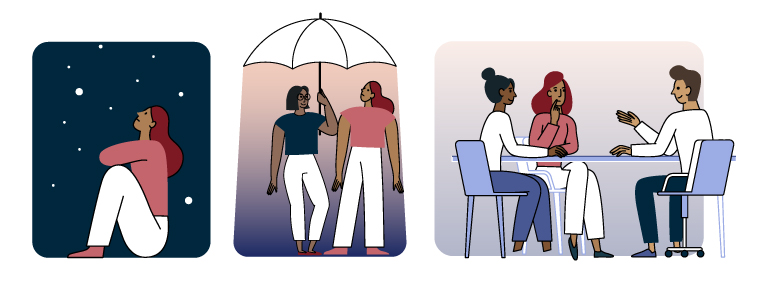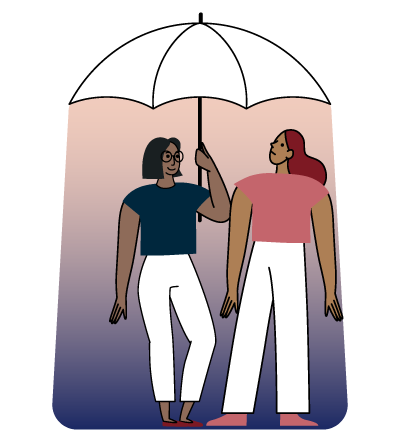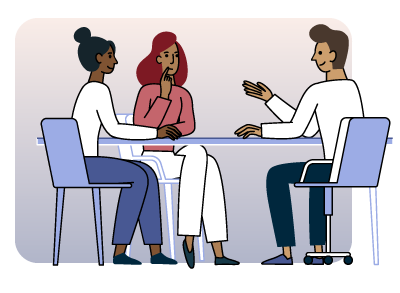Managing Addiction Recovery in Isolation

For one sponsor at Alcoholics Anonymous, her motto is this: “AA always shows up.”
When the woman received a phone call from the police informing her that the person she was sponsoring had been arrested for a DUI, her first instinct was to help in person. However, required social distancing amid the COVID-19 pandemic meant being physically present for the person wasn’t an option.
By understanding the ways isolation can harm recovery, social workers can play a critical role in supporting those managing efforts to stay sober.
“Normally, I would have gone with that person to pick up their lost vehicle from the impound and say, ‘Hey, let’s do this together,’ because it can be shameful to be reminded of slip-ups when you’re trying to be sober,” said the sponsor, who prefers to remain anonymous.
Social distancing has uprooted substance use recovery, which tends to rely on peer support. And isolation can be a breeding ground for loneliness and secrecy, underscoring the importance of staying connected to sponsors and other support systems even when they can’t be in the same physical space. By understanding the ways isolation can harm recovery, social workers can play a critical role in supporting those managing efforts to stay sober.

What Challenges Does Isolation Create for People in Recovery?
“Social isolation and quarantine go completely against the nature of substance abuse recovery,” said Cara Burton, a licensed clinical social worker who works in an addiction treatment clinic. “It’s forced people to be a little more proactive in their own recovery and put in more effort as opposed to just showing up to a meeting face to face.”
According to the Addiction Center, substance use relapses are on the rise during the pandemic. Some of the challenges that social isolation present for people in recovery include:
Loss of routine. Lack of daily structure and direction can result in feelings of boredom, emptiness and abandonment. Poor mental health. Pandemics are stressful. Increased anxiety can result in relapses and problematic substance use. Interruption of services. People may not be able to access the same services in quarantine or may lose critical health care coverage. Lack of connection. Support systems encourage responsible living and ensure that there are people available to help in case of dangerous situations like an overdose. Lack of accountability. Peers help to ensure that those in recovery are being honest. It’s easier to skip sessions when you do not have to be physically present. Secrecy. Isolation can make emerging problems easier to hide from friends and peers, making them more likely to go unaddressed.“Now more than ever, because of the stress and the sense of hopelessness that can easily emerge if you don’t feel like you have alternatives, everything may look very dark,” said Dr. Nora Volkow, director of the National Institute on Drug Abuse in an interview about coping with addiction during COVID-19. “With social distancing, it’s much harder to get social reinforcers that can help buffer the strong desire to take drugs.”
For those who are at risk of returning to substance use, it’s important to be aware of the warning signs of relapse, which include:
- Modeling poor eating or sleeping habits
- Declining hygiene
- Talking to past friends who still use
- Constant lying
- Bottling up emotion
- Skipping or avoiding virtual support meetings
- Withdrawing from positive friends

How Can People in Recovery Maintain Critical Support?
Peer support is critical for recovery. According to a 2016 Substance Abuse and Rehabilitation article on the benefits of peer support groups in treating addiction, peer support helps lessen feelings of isolation and sustain coping efforts. It’s a constant that people with substance use disorder can rely on while they move through their journey of care and recovery. They can share the experience of addiction with each other, which aids the recovery process.
“In terms of AA in the midst of the pandemic, there’s no reason that someone can’t be connected to another alcoholic who’s willing to help around the clock. What we need to hear in early sobriety is that we belong somewhere,” said the representative from Alcoholic Anonymous. “It’s about paying it forward and creating support.”
Maintaining sobriety depends on having a sense of structure, predictability and consistency, Burton added. To establish that, those in recovery can find support in the following ways:
Attend AA meetings. AA meetings are a helpful place where you can share experiences and struggles and be open and free with your emotions during recovery. Some groups may still meet over the phone or through video chat. Regularly attend therapy. Most states have relaxed guidance regulations for telemental health services. Maintaining a relationship with a therapist and regularly attending sessions can provide consistency. Get physical exercise. Go for a walk. Getting out into the environment can help boost mood levels and reduce stress. Find positive relationships. You can host or join an existing support groups where positive, sober peers can reinforce sobriety and help navigate recovery. Calling a friend and staying in touch can also help reduce stress. Engage in harm-reduction practices. According to the American Psychological Association’s guidance to preventing substance abuse during COVID-19, if you absolutely must drink, videoconference with a friend while using. Utilize the internet. Consider seeking out online speakers from YouTube discussing recovery or find a virtual conference related to addiction.
How Can Loved Ones and Professionals Support People in Recovery?
Sustaining recovery can also be made easier with the help of proactive friends and family. In a 2020 General Psychiatry study on preventing and treating substance use disorders during the pandemic, the authors reported on how to work through addiction recovery and relapse risk.
For loved ones of those struggling with substance abuse, they recommended:
Pay close attention to emotions and behavior. Negative emotions can lead to greater substance misuse. Notice if your loved one has changed their diet, sleep patterns or daily routines, as these can be indicators of a relapse into addiction. Build out a social support system. Family members and close friends should communicate frequently and create group networks to help each other work together if intervening with a loved one suffering from substance abuse. Avoid blame. If your loved one has suffered a relapse, try not to blame them for it. Understand that their emotions have been destabilized. Observe them closely and, if necessary, take them to a medical institution for treatment if deemed safe enough. Remove triggers. Get rid of, hide or monitor substances in the home. If the case is extreme enough, take control of all finances to ensure someone struggling with addiction has no access to purchase harmful substances.Social workers and other helping professionals can also support the path to recovery through crisis intervention. For example, some families may refuse to allow their loved one experiencing substance use disorder to return home. Social workers can help find temporary housing for people who are displaced at a time when so many shelters are at over capacity, writes Dawn Whitten, DSW, in a Social Work Today news article about social work’s response to COVID-19.
“It’s also important to be aware that everyone is at risk now for a problem with substances,” said Burden. “Social workers should think about things like, ‘Are more people drinking during work hours when teleworking?’”
Promoting the use of telehealth is one way to help the broader population who may be at risk for misusing substances. Ultimately, supporting recovery comes back to the critical role of fostering connections to the necessary resources and supports, regardless of the barriers that exist.
“As far as AA goes in this moment, there’s no reason that somebody couldn’t be connected to another alcoholic who’s willing to help around the clock, and that has become so clear to me during this time,” said the AA representative. “That’s what we need in early sobriety—to be able to hear, ‘You’re one of us. Call me.’ This is how we help each other.”
What Resources Exist for People Dealing With Addiction and Recovery During the Pandemic?
ONLINE SUPPORT GROUPS
- AAOnlineMeeting: virtual meeting opportunity for those experiencing or in recovery from alcohol addictions.
- Virtual NA: resource that provides a meeting search for both online and phone meetings of Narcotics Anonymous.
- In the Rooms: free online recovery tool offering multiple recovery online meetings that include 12-step recovery as well as wellness and mental health.
- Unity Recovery: free digital recovery meetings and support groups held daily through a joint effort of multiple recovery organizations based around the country.
- Young People in Recovery: schedule of virtual recovery-focused events via Zoom or Google Hangouts.
- SMART Recovery: online forum for those in recovery and family and friends of addicts that provides daily check-ins and peer support groups.
- Recovery Dharma Online: virtual meeting group for those struggling with addiction, with Buddhist practice in mind.
- Refuge Recovery: online recovery community that uses Buddhist-inspired practices to help overcome addiction.
- LifeRing Secular Recovery: online sober community where people share practical experiences on sobriety support.
APPS TO SUPPORT RECOVERY
- Sober Grid: This social networking app lets you create profiles to interact with other people in recovery and support and encourage one another. It allows for anonymous check-ins about the state of your sobriety and your mood.
- SoberTool: This is a tool to help track your sober days and provides daily motivational messages.
- WeConnect: This app provides daily reminders to help you stay on track with recovery. You can create reminders to call your sponsor, attend a virtual meeting or meditate.
- 12 Step AA, NA Daily Meditation: This app provides guided meditations, soothing music, prayers and 12-step recovery audio.
- I Am Sober: This app tracks sober days and sober milestones. It motivates you to build new habits and receive encouragement from the recovery community.
EDUCATIONAL RESOURCES
- COVID-19: Accessing Critical Medication-Assisted Treatment for Your Loved One
- In a Time of Disruption, Protecting Your Child From the Risks of Substance Use
- 6 Alternative Zoom Happy Hour Ideas
- Welcoming an Adult Child Back Home Because of COVID-19
- One-on-One Help to Address a Young Person’s Substance Use
- This article is for informational purposes only. If you or somebody you know is struggling addiction, reach out to a health care provider or consider calling the Substance Abuse and Mental Health Services Administration Disaster Distress Helpline at 1-800-985-5990.
Are you interested in a career supporting those experiencing addiction? Learn more about how a clinical social worker serves this population or review our list of online clinical social work programs.
This article was published in September 2020.

